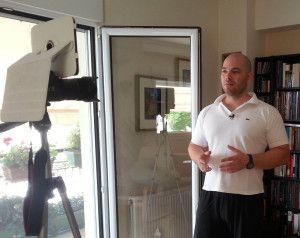My mother tongue is Greek. The language I am fluent in is NOT English. Yet, I’ve decided to produce my videos in English. Why? And, how does this decision affect my YouTube videos? Let’s see some ways that will help you overcome the obstacle of making videos in your non-native language.
People have commented on my videos:
- “Your English sucks”
- “Work on your English, dude” and
- “I’ve never heard worse English in my life”
No, none of my channels teach you how to speak properly in English or aim to become masterpieces in English literature. Still, viewers are complaining from time to time about my pathetic language when8 talking.
I can’t blame them.
My accent is terrible. Often, every other sentence has at least one grammar or syntax mistake. Even when using a teleprompter, I make mistakes. And a teleprompter cannot help me improve my accent, can it?
So, how am I trying to battle with my horrific English? No, increasing the background music doesn’t cut it.
1. I remind myself that content is king
People are following me at the social media, not because of my writing skills in English, but because of the content I share. I try to help people out and solve their problems when it comes to risking their money.
My field of expertise is gambling and investing. I risk money to make money. I am not a full-time blogger or an English author. I gamble. I invest. I don’t write professionally.
So, building a following comes down to my knowledge, my story and how it can affect other people’s lives. Surely if my English was my native language, fewer people would complain of my accent and more people would probably follow me.
But in the end, I would share the very same content. And content is king, no matter how terrible my English accent is. Thus, if you are not an English native speaker, remind yourself of the content you want to share. Is it valuable? Will it help another person out there? Then, ignore your weakness in English and build on your strengths: your actual content.
2. I write the script before recording the videos
I used to record myself without a script in my hand. I just had a rough idea of what I would talk about. What’s worse, I rarely edited the footage afterwards! There were long pauses, lots of “errr’s” and a bad general flow in the final video.
Nowadays, I write the script first. Often, I write it in Greek and have it translated in English by a professional translator. This also minimizes the grammar mistakes, not to mention that I have two unique blog posts to accompany the video; one in English and one in Greek. What’s more, the script can be used for captions or subtitling the video.
So, write a script in your native language and translate your words in English. It’ll be much easier to narrate during the video when the time comes. For an added bonus, your final video will be much shorter. And viewers love short videos.
3. I use a teleprompter or make jump cuts

Now that I have a script for my next video, it’s time for the most frustrating and stressful task: to read it in front of the camera.
To carry this task, I have been using a teleprompter. The trouble with a teleprompter is that viewers will notice you are not looking straight into the camera. Some will also notice that you’re reading from a teleprompter.
If you ask me, that doesn’t matter that much. What does matter, is that you sound unnatural. You do look and sound like a robot. Even your body language is tense. Or maybe it’s just me who get nervous in front of any kind of camera.
Recently, Simon Cade uploaded an excellent video on how to make Youtube videos properly. In that episode, he explains why he prefers making jump cuts instead of using a teleprompter when he’s recording himself. Although he ends up with one-hour-long footage for a 5-min Youtube clip, his method might work better for you. Note that Simon’s videos seldom receive dislikes if ever and people keep subscribing to his channel. He must know his filmmaking business.
So, use a teleprompter or make jump cuts when putting your script in action.
4. I may record videos in my native language & add subtitles
As a last resort solution, you might want to try producing videos in your native language. I haven’t gone that route, but I admit it has crossed my mind.
You still need a script for best results, but you’ll definitely sound a lot more natural. Then you need to add English subtitles, of course, if you are targeting audience from UK and USA. Just don’t forget to notify your viewers to turn on subtitles right from the beginning of your episodes. Otherwise, I bet most of them will go away on the moment they hear you speak a language foreign to them. Question is, will they sit and watch a talking head till the end, speaking in a non-English language in the first place? That’s an experiment to be conducted.
Will these steps prevent people from criticizing my English? Guess not and besides, it’s not my goal. My point is that your content is much more important than your accent. It’s called storytelling for a reason and it rarely has to do with your spoken language.


